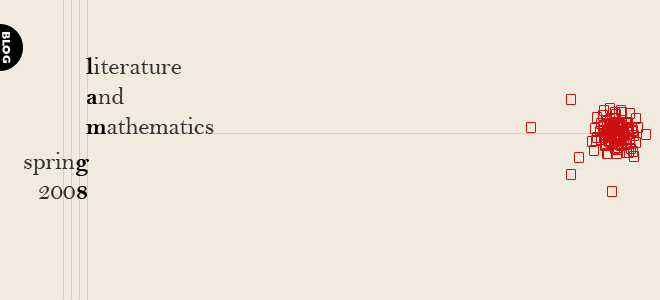I have to run to the post-office to get a package out...and will edit/finish this when I get back
But in preface: Has anyone read Daniel Quinn's Ishmael or seen the 1999 movie Instinct with Anthony Hopkins?
The distinction between the Cro-Mag’s and Neanderthals in Square’s story seems to be Cro-Mag’s realization of superiority. On page 174 Square talks about belief in superiority, specifically of the Cro-Mag’s over Neanderthals. If the Neanderthals were taken to symbolize all ‘uncivilized’ organisms, this realization reflects the human faith in ownership and control the protagonist of Ishmael is taught to recognize.
A little background: Ishmael tackles the ethics of humanity being out of touch with ‘natural evolution’. Sustainability is stressed as the main victim of a society in which individuals claim ownership to more resources than they require at once. And the solution is outlined as returning to a more ‘primitive’ way of life.
Square touches on the interconnectedness of all life in his description of Darwin’s moth and an orchid as “having developed because each made the other possible.” I think Square’s fear of the genetic-modification trend stems from a similar fear of unsustainability. That somehow by choosing genes for oneself without god-like knowledge of interconnectedness we are waging “pogrom” (in Square’s words) against inhuman organisms that are subject to our culture, our evolution. Furthermore choosing phenotypes or genes for ourselves or our children is so full of unforeseeable variables that it is no less a game of chance than Plinko.
But then again as we live in a human-created environment all our lives, it would seem that this trend of modification embraces Darwin’s ideas of fitness and natural selection to enhance our chances of natural selection through fitness to our formed environment.
I personally consider myself a futurist and don’t fear the destruction of the natural as we know it.

3 comments:
Ishmael is one of my favorite books. I hadn't even thought to connect it to VAS, but your blog is really interesting. Thanks! It is true that we seem to think that we are the final stage in the evolutionary process, and Quinn points out that we may just be another step. Does your comment about being a "futurist" suggest that you feel that a society full of "takers" is a part of the natural evolution?
I think a society of "takers" is fully natural, though it may not be adaptive to humanity as a species and certainly undermines the sustainability of other species.
My "futurist" comment was meant to reflect a desire to not believe or place value on an idea of a "natural order". Darwinian evolution requires generational change to accomplish specialization, but as Square points out we can speak, communicate, and together manipulate both our environment and ourselves, so why not do so?
There's this Aristotle quote that has been haunting me since I read it for class:
"nothing that exists by nature can form a habit contrary to its nature"
or a quote from the book:
"When asked why the discovery channel he worked for was trying to clone a woolly mammoth" project paleontologist, Larry Agenbroad answered
"Why not?"
In an extreme case: AI machines created by man evolve and reproduce , competing with man for space and resources and eventually winning.
Is this unnatural? or does it just suck for man?
I have read just about everything that I could by Daniel Quinn after reading Ishmael. It has been a while though. I think the idea of a society of takers being a natural phenomenon is pretty well backed up by economics. I am a true believer of modern micro-economic thought. Last night I bought Tim Harford's new book "The Logic of Life" and in the first chapter he discusses an experiment done by some economic researcher where they showed that if you could set up a situation where a lab mouse had to make economic decisions, guess what, the mouse made rational economic decisions! I may discus this further in a future blog but it truly is an interesting experimental outcome.
Post a Comment